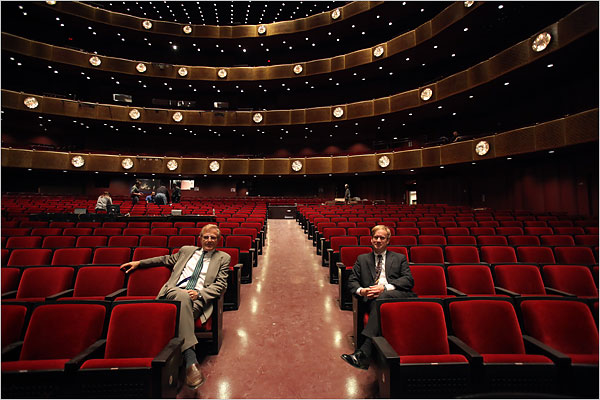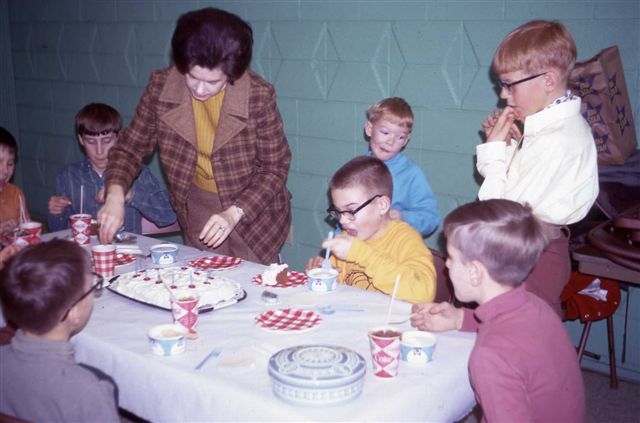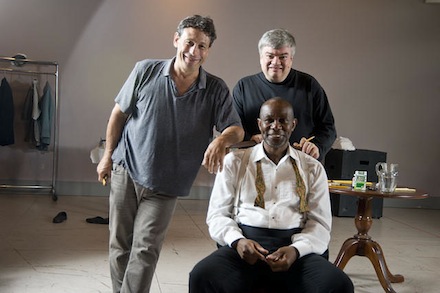“It was not till quite late in life that I discovered how easy it is to say: ‘I don’t know.'”
W. Somerset Maugham, A Writer’s Notebook
Archives for March 2013
TT: Snapshot
Lauritz Melchior sings Wagner’s “In fernem Land” (from Lohengrin) on The Voice of Firestone in 1951:
(This is the latest in a series of arts-related videos that appear in this space each Monday and Wednesday.)
TT: Almanac
“Of course it was cause and effect, but in the necessity with which one follows the other lay all tragedy of life.”
W. Somerset Maugham, Of Human Bondage
TT: Lookback
From 2003:
I have a number of older musician friends who claim to hate all kinds of post-Sinatra pop music, for example, and I also get occasional letters from readers who want to know how I could possibly admire the music of Benjamin Britten or the paintings of Giorgio Morandi, or take a movie like Ghost World seriously. What nearly all these latter correspondents seem to have in common is that they really, truly don’t like any modern art, a position which puzzles me. Now, I freely admit to having problems with large tracts of the modern movement, and I long ago brought in guilty verdicts on atonal music and minimalist art, but at no time in my life has it ever occurred to me to dismiss all modernism as a snare and a delusion.
Are these anti-modernists poseurs?…
Read the whole thing here.
TT: Almanac
“You are not angry with people when you laugh at them. Humour teaches tolerance, and the humorist, with a smile and perhaps a sigh, is more likely to shrug his shoulders than to condemn.”
W. Somerset Maugham, The Summing Up
TT: And yet so far
 Drama critics see shows free, and they’re normally given two aisle seats to every show that they see. This is–usually–a fabulous perk, especially for me. Nowadays I spend so much time on the road that I scarcely ever get to see my New York-based friends save by taking them to a play or a musical, after which we grab a bite to eat and catch up.
Drama critics see shows free, and they’re normally given two aisle seats to every show that they see. This is–usually–a fabulous perk, especially for me. Nowadays I spend so much time on the road that I scarcely ever get to see my New York-based friends save by taking them to a play or a musical, after which we grab a bite to eat and catch up.
Because I’m seeing a lot of shows in Manhattan for the first time in several months, I’m catching up with a lot of friends whom I haven’t seen in a like amount of time, if not longer. Mrs. T informed me the other day that we spent more nights out of town than in our New York apartment in 2012. As a result, I’ve been seeing friends in recent days–good ones, too–whom I last saw a year ago.
Those of you who read this blog regularly will know about much, if not all, of what happened to me in the past twelve months. The death of my mother, my first stay at the MacDowell Colony, three back-to-back productions of Satchmo at the Waldorf, the completion of my Duke Ellington biography…that’s quite a bit of catching-up to pack into a single evening. As Jeff Bridges says to Beau Bridges in The Fabulous Baker Boys, “Lotta water.”
On the other hand, it’s also true that you do know about these things, thanks to this blog and the other social media, on which I routinely describe my current doings. As for my friends, most of them follow me on line, and I also stay in more direct touch with them via e-mail, my schedule being too erratic for me to spend much time on the phone.
 All of which makes me wonder whether the nature of friendship itself has changed in the age of the internet. Our Girl in Chicago, my best friend, moved away from New York a couple of decades ago, and since then she’s only been back in town for a day or two at a time. Yet we’ve maintained the closeness of our friendship without apparent effort, in part because her move to Chicago coincided with the emergence of e-mail. I actually gave OGIC her very first dial-up modem as a present. We were already good friends when she left New York, but it was then, not before, that we became truly close, and it happened on line.
All of which makes me wonder whether the nature of friendship itself has changed in the age of the internet. Our Girl in Chicago, my best friend, moved away from New York a couple of decades ago, and since then she’s only been back in town for a day or two at a time. Yet we’ve maintained the closeness of our friendship without apparent effort, in part because her move to Chicago coincided with the emergence of e-mail. I actually gave OGIC her very first dial-up modem as a present. We were already good friends when she left New York, but it was then, not before, that we became truly close, and it happened on line.
It was around the same time, in 1993, that I stopped going to an office and started working at home. After I did that, I no longer saw anyone outside of my immediate family on a routine, day-to-day basis. Like most big-city apartment dwellers, I don’t know any of the people in my building other than casually, and after I started traveling for The Wall Street Journal, I simply wasn’t around often enough to get on closer terms with my neighbors.
 This is a radical change from the way I lived prior to moving to New York. The small-town neighborhood in which I grew up, and in which my brother still lives, was very closely knit. We knew everybody on our block. When I was in college, most of my friends were people whom I saw every day. Now none of them is.
This is a radical change from the way I lived prior to moving to New York. The small-town neighborhood in which I grew up, and in which my brother still lives, was very closely knit. We knew everybody on our block. When I was in college, most of my friends were people whom I saw every day. Now none of them is.
The social media have made it much easier for me to stay in touch with good friends whom I don’t see regularly. And while I only “friend” people on Facebook whom I already know, Twitter is a different story. I’ve become “real-time” friends with a number of people whom I originally “met” through Twitter. Nor are my latter-day friendships in any way shallow: they feel as close to me as the friendships of my now-distant youth.
That said, I can’t help but long for the sheer palpability of those youthful friendships. I’ve told Our Girl more than once that I wish we lived in the same building, or even the same neighborhood (which has never been the case, even when she lived in New York). Perhaps the intensity of our friendship is heightened by the fact that we see one another so infrequently. Perhaps, too, the social media are a fully adequate substitute for the dailyness of old-fashioned can-I-borrow-a-cup-of-sugar friendship.
 Perhaps–but somehow I doubt it, which may be one of the reasons why I’ve taken so strongly to working in the theater. Theatrical friendships, to be sure, tend to be short-lived, off-and-on affairs, but when you’re working on a show, you see the same people day after day, and the intimacy that arises from that physical ubiquity is a thing unto itself.
Perhaps–but somehow I doubt it, which may be one of the reasons why I’ve taken so strongly to working in the theater. Theatrical friendships, to be sure, tend to be short-lived, off-and-on affairs, but when you’re working on a show, you see the same people day after day, and the intimacy that arises from that physical ubiquity is a thing unto itself.
I felt the same way at the MacDowell Colony. It was the first time in years that I’d seen the same group of people each day, and I loved knowing that we’d all be together at dinner, and that I could spend time with the people I liked best at will rather than having to go out of my way to arrange meetings with them. One of my fellow colonists–a Manhattanite, naturally–actually fantasized about starting a commune when she got back home.
Mrs. T, who knows me better than anyone else, thinks that I have a particular gift for immediate intimacy, a knack for flinging the doors wide at will. True or not, I know that I’ve never felt lonely in New York, a city that is famous (in E.B. White’s words) for bestowing on its inhabitants “the gift of loneliness and the gift of privacy.” But I know, too, that there are other ways to live, and as I grow older, I find that I miss them more than I ever thought I would.
TT: Just because
George Balanchine’s “Tchaikovsky Pas de Deux,” danced in 1979 by Patricia McBride and Mikhail Baryshnikov:
(This is the latest in a series of arts-related videos that appear in this space each Monday and Wednesday.)
TT: Almanac
“I make dances because crowds are kept at a safe distance. That’s what proscenium arches are good for.”
Paul Taylor, Facts and Fancies: Essays Written Mostly for Fun
